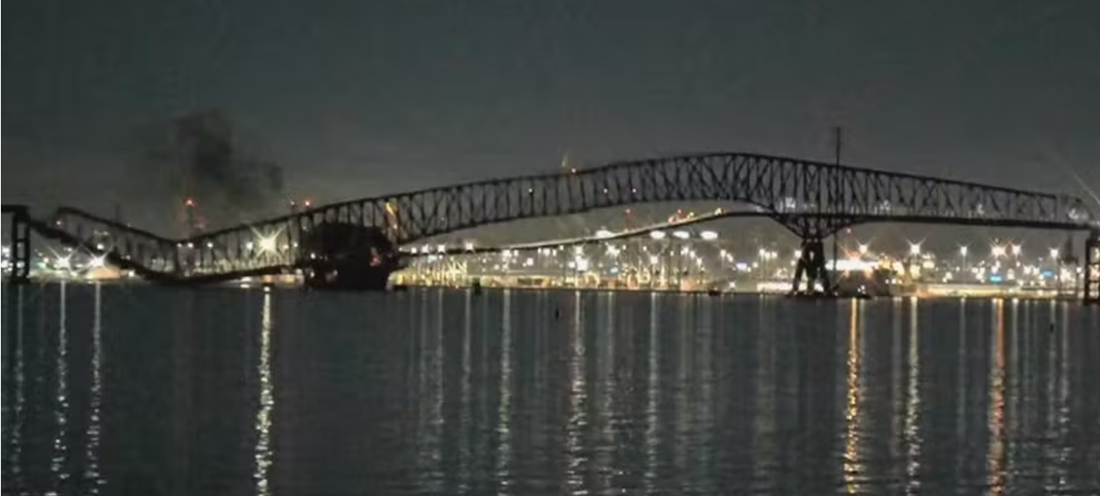
Ship that struck Baltimore bridge lost power twice before crash
May, 15, 2024 Posted by Gabriel MalheirosWeek 202420
The cargo ship Dali that crashed into Baltimore’s Key Bridge in March had a pair of catastrophic electrical failures minutes before the crash and had experienced two blackouts a day earlier, according to a preliminary report released Tuesday (May 14) by the National Transportation Safety Board.
The 24-page report details investigators’ early factual findings on the March 26 disaster that took down the 1.6-mile long steel structure, killing six construction workers on the bridge and severing access to critical shipping routes in and out of the Port of Baltimore.
According to the report, the two power outages occurred three ships’ lengths from the bridge and were triggered by the tripping of two critical circuit breakers, which caused several pumps required for the ship’s single propeller and its single rudder to stop working. The emergency generator was not configured to power the ship, the report said.
The ship at the time of the failure was under the control of an apprentice pilot, who was accompanied by a senior pilot. When the pilots boarded, the captain reported the ship was in good working order, according to the report.
NTSB investigators said the crewmembers tested negative for drugs and alcohol, and the fuel tested negative for contaminants three times.
About 10 hours earlier, while the ship was still moored in the Port of Baltimore, it experienced two onboard blackouts, one caused by a crew error, according to the report.
“The NTSB is still investigating the electrical configuration following the first in-port blackout and potential impacts on the events during the accident voyage,” the report states.
The FBI and Coast Guard are looking into whether the crew failed to report the in-port power outage as part of a criminal investigation, according to a US official familiar with the matter.
An NTSB preliminary report does not conclude a probable cause. Those findings will be part of a final report that could take investigators up to two years to complete.
The report notes several areas that are still being investigated, including “the design and operation of the Dali’s power distribution system (including its breakers).”
The report took 49 days to publish, longer than the typical month it takes for the agency’s investigators to publish such a report.
On May 15, NTSB Chair Jennifer Homendy testified on the bridge collapse before the House Committee on Transportation & Infrastructure. Other witnesses include officials from the US Coast Guard and the Army Corps of Engineers.
The ship, weighing about 213 million pounds, had lost engine and electrical power shortly before hitting the bridge, officials said. Video footage from moments before the crash showed plumes of black smoke coming from the vessel as well as the lights flickering on and off, likely due to an emergency generator activating after an initial blackout.
Six construction workers who were filling potholes on the bridge were killed in the disaster. The victims were immigrants from El Salvador, Mexico, Guatemala and Honduras who worked to support their families.
The NTSB report details the near-catastrophic experiences of a crew member on the ship and a road maintenance inspector on the bridge.
The crew member was on the bow of the ship at the time of the crash. “(He) told investigators that, as he was releasing the brake on the port anchor, he had to escape from the falling bridge before he was able to reapply the brake,” the report states.
The inspector on the bridge had been walking the span when the ship struck. “He ran north and made it to the nearest surviving span before the rest of the bridge collapsed,” the report states.
The bridge’s collapse also has strangled the regional infrastructure. The wreckage of the bridge has clogged the port, a major shipping channel for the sugar and automotive industries. In addition, the Key Bridge was a critical thoroughfare, with 30,000 commuters relying on it every day, Maryland Gov. Wes Moore said.
Officials have vowed to rebuild the bridge – but the exact cost remains unclear. A spokesperson for the Insurance Information Institute has estimated the bridge alone could be worth more than $1.2 billion.
President Joe Biden has said he’s committed to helping rebuild the bridge as soon as possible and said the federal government will bear the costs.
Multiple investigations are underway to try to determine who might be responsible for the catastrophe. Last month, Baltimore Mayor Brandon Scott announced a probe “to hold the wrongdoers responsible and to mitigate the immediate and long-term harm” to residents.
The ship’s Singaporean owner, Grace Ocean Private Limited, and manager, Synergy Marine PTE LTD, filed a petition in federal court last month asking for a $43.6 million limit on potential liability payouts.
The city of Baltimore has asked the court to deny that request. It also filed a legal claim against Grace Ocean and Synergy Marine, accusing both companies of having an “incompetent crew” aboard the Dali that lacked proper skill and training,
Darrell Wilson, a spokesperson for the ship’s owner and manager, declined to comment to CNN “out of respect for the ongoing investigations and any future legal proceedings.”
-
Fruit
Oct, 24, 2022
0
Brazil guava exports grow over 1000% in two years
-
Grains
Aug, 13, 2019
0
US corn crop might be greater than expected
-
Other Logistics
May, 05, 2023
0
SAAM closes deal to acquire tugs from Starnav for its Brazil operations
-
Shipping
Nov, 07, 2021
0
Terminal puts waterways and ministry in conflict

